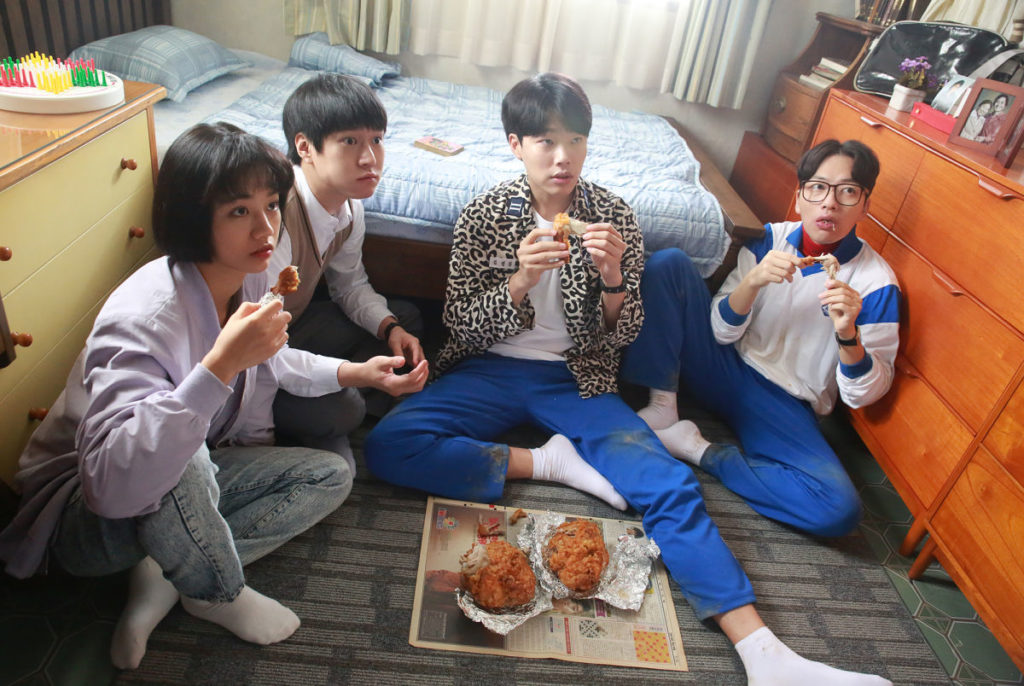
by Yanichka Ariunbold, section editor
Allow me to describe the four characters every stereotypical K-Drama has:

1) There’s the female lead/main character, who’s a socially awkward teenage to mid-20s girl who perpetually crushes on any guy who says more than one word to her. Notably, this character eats ramen aggressively and is either physically weak or strong beyond the scope of a normal person. The show emphasizes how poor she is, and the weirdest part is that all the other characters in the drama call her unattractive and “plain,” when the actress herself is insanely gorgeous.

2) Then there’s the dashing, slightly unhinged male lead who’s extremely rich (being the son of the CEO of a Korean Fortune 500 company), famous (as in followed by tabloids everywhere he goes—this usually happens to be a main plot point), and, most importantly, an asshole. Sure, he has a semi-dark past that is supposed to be the reason he’s so angry at the world, but his lack of empathy seems almost…sociopathic. This immorality is bolstered when he meets the female lead but fortunately wears off when he eventually falls in love with her and her lovably crass ways. Also, this character most likely has really, really soft-looking hair.

3) Another chick comes into the picture: she belongs to the same high-class, wealthy clique that the male lead belongs to, and since apparently everyone knows everyone in that group, they have some major history. Their relationship or whatever ended badly, so they still have unresolved feelings for each other—something this character exploits. She threatens the main female lead and wears expensive shoes on the daily, and there are a lot of random scenes of guys literally falling over themselves as she walks down the street.

4) Lastly, The Other Dude. Unlike the other characters, his economic status probably doesn’t really come up? The female lead either intensely crushes on him at the beginning and forgets about him or gradually friend-zones him throughout the whole drama. Usually the childhood friend or the main character’s former “idol,” he has some hecka dramatic confrontations with the male lead, heavy breathing included. Strangely, he abruptly accepts the new couple as the drama winds down and is even at their wedding in the drama finale as, of course, the best man. The motivations and character development with this one are probably the sketchiest.
For the record, not all K-dramas are like this. It’s just sometimes the popular ones–Marriage Not Dating, Boys Over Flowers, Flower Boy Ramen Shop, Hi! School On, Dream High, You are Beautiful, AND THE LIST GOES ON–tend to have really repetitive plot lines, which isn’t necessarily a bad thing. Those dramas definitely have their charm (else, why would I have watched them all?). It’s an effortless, entertaining way to kill time on a slow weekend, and staring at really, really symmetric faces for hours, if you’re going to be staring at something, isn’t half-bad, I suppose. That being said, there’s only so much of shallow dialogue and nonexistent or rushed character development you can take at a time, even if you are transfixed by the male lead’s incredibly soft hair.
Going into the hit Korean television show Reply 1988 (also called Answer Me 1988), I expected it to be another mind-numbing drama requiring minimal involvement on my part, but instead, I was happily proven wrong. In fact, I got altogether too invested in this utterly unique, hilarious story revolving around an old neighborhood and the dynamics within and between the five charming families living there.

First off, Reply 1988‘s main character, Sung Deok-Sun/Sung Soo-Yeon (her mom makes everyone call her “Soo-Yeon” because a fortune-teller told her that that would be the only way her daughter would pass her college entrance exams) is decidedly not the average, “quirky” K-drama heroine of an average K-drama. Deok-Sun is Type A, outrageous, and fundamentally ridiculous, as many of her neighborhood friends seem to be in their own way. Sullen Jung-Hwan, “moronic” Taek, Stevie-Wonder-crazed Dong-Ryong, and dependable Sun-Woo all make for a colorful, nuanced cast.
Other stand-out characters are the fathers of the four families. From their awkward competitiveness (a whole episode centered on a high stakes card game that was unnecessarily intense) to their dad jokes, Sung Dong-Il, Kim Sung-Kyun, Choi Moo-Sung are impossibly funny but incredibly believable and well-developed.
Moreover, unlike so many K-dramas out there, Reply 1988 didn’t suffocate with heavy emphasis on romance; there was hardly any deep-gazing-into-each-other’s-eyes until the second half of the drama (and even then, that was pretty limited), which was so, so refreshing. Hilarious gags trumped dramatic flairs, and as a viewer predominantly exposed to 1) drawn-out and violent or 2) drawn-out and unintentionally vapid shows, I welcomed the light-heartedness.
Of course, the most enticing feature of the show is the important year it’s set, 1988, which coincides with the Seoul Summer Olympics and a novel influx of Western influence on Korean pop culture. This era of change is what drives practically all aspects of the show: the characters’ supremely high-wasted pants, the rise of Korean idol groups and pop stars, the nostalgic family dynamic and slapstick comedy.
For all its humor, however, the drama does have its rare yet impactful somber stills. In one haunting scene, the teenagers, now 20-something-year-olds back in the neighborhood for winter vacation, fall asleep in the room they hung out together in for most of their childhood– all the while, Lee Seung-Hwan’s “Empty Heart” plays on Jung-Hwan’s cassette-player. As the song fades, everyone awakens and leaves. It’s a beautiful, heart-wrenching testimony to growing up.
So go ahead, start watching Reply 1988. Get ready for the best music you’ve listened to in a long while, staggeringly funny exploits, and a welcome, mundane take at a modernizing Korea. I think director and producer Shin Won-ho summarizes the essence of the show pretty successfully: “We tried to depict history as ordinary people experienced it.”
Photos and gifs taken from dramafever.com.

